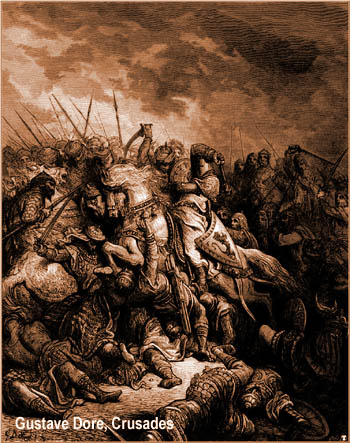
Professor Thomas Madden chairs the history department at St Louis University, Missouri, USA. He is also the author of A Concise History of the Crusades. He says, “Since September 11, the Crusades are news.”
The wars between Christians and Muslims known as the Crusades began in 1095 AD and lasted till 1291 AD. Some people are suggesting that modern terrorism by groups such as Al Qaeda and Jemaah Islamiah are revenge for Christian aggression during the Crusades a thousand years ago.
Not true, says Madden. The entire history of the Crusades is one of Western reaction to Muslim advances. The Crusades were no more offensive than was the American invasion of Normandy. And although the first Crusade was successful, the Muslim jihad response 50 years later was much greater. The Crusades ended in bitter defeat, and Muslim armies went close to conquering the whole of Europe during the 16th century.
Madden: From the Muslim perspective, the Crusades were not worth noticing. It was not until the 19th century that revisionists started to rewrite history. That may seem strange when you consider that Osama bin Laden and other Islamists often refer to Americans as “Crusaders.” It’s important to remember that during the Middle Ages—really up until the late 16th century—the superpower of the Western world was Islam.
Muslim civilizations were wealthy, sophisticated and immensely powerful. The West was backward and relatively weak. It is noteworthy that with the exception of the First Crusade, virtually every other Crusade launched by the West—and there were hundreds—was unsuccessful.
The Crusades may have slowed Muslim expansionism, but they in no way stopped it. Muslim empires would continue to expand into Christian territories, conquering the Balkans, much of Eastern Europe and even the greatest Christian city in the world, Constantinople.
 If you had asked someone in the Muslim world about the Crusades in the 18th century, he or she would have known nothing about them. They were important to Europeans because they were massive efforts that failed.
If you had asked someone in the Muslim world about the Crusades in the 18th century, he or she would have known nothing about them. They were important to Europeans because they were massive efforts that failed.
However, during the 19th century, when Europeans began conquering and colonizing Middle Eastern countries, many historians—in particular nationalist or royalist French writers—began to cast the Crusades as Europe’s first attempt to bring the fruits of Western civilization to the backward Muslim world. In other words, the Crusades were morphed into imperialist wars.
Those histories were taught in the colonial schools and became the accepted view in the Middle East and beyond. In the 20th century, imperialism was discredited. Islamists and some Arab nationalists then seized on the colonial construction of the Crusades, claiming that the West was responsible for their woes because they had preyed on Muslims ever since the Crusades.
It is often said that people in the Middle East have long memories; it is true. But in the case of the Crusades, they have a recovered memory: one that was manufactured for them by their European conquerors.
Zenit: How are the Crusades different from Islam’s jihad?
Madden: The fundamental purpose of jihad is to expand the Dar al-Islam—the Abode of Islam—into the Dar al-Harb—the Abode of War. In other words, jihad is expansionist, seeking to conquer non-Muslims and place them under Muslim rule.
Those who are then conquered are given a simple choice. For those who are not People of the Book—in other words, those who are not Christians or Jews—the choice is convert to Islam or die. For those who are People of the Book, the choice is submit to Muslim rule and Islamic law or die. The expansion of Islam, therefore, was directly linked to the military successes of jihad.
The Crusades were something very different. From its beginnings Christianity has always forbidden coerced conversion of any kind. Conversion by the sword, therefore, was not possible for Christianity. Unlike jihad, the purpose of the Crusades was neither to expand the Christian world nor to expand Christianity through forced conversions.
Instead, the Crusades were a direct and belated response to centuries of Muslim conquests of Christian lands. The immediate event that sparked the First Crusade was the Turkish conquest of all of Asia Minor in the 1070s through 1090s.
The First Crusade was called by Pope Urban II in 1095 in response to an urgent plea for help from the Byzantine emperor in Constantinople. Urban called the knights of Christendom to come to the aid of their Eastern brethren.
Asia Minor was Christian. Part of the Byzantine Empire, it had been first evangelised by the apostle Paul. The apostle Peter had been the first bishop of Antioch. Paul had written his famous letter to the Christians of Ephesus. The creed of the Church was penned at Nicaea. All of these were in Asia Minor (now Turkey).
The Byzantine emperor begged the Christians of the West for aid in recapturing these lands and expelling the Turks. The Crusades were that aid. Their purpose, though, was not only to reconquer Asia Minor but also to recapture other formerly Christian lands that had been lost due to Islamic jihads. This included the Holy Land.
In a nutshell, therefore, the major difference between Crusade and jihad is that the former was a defence against the latter. The entire history of the Eastern Crusades is one of response to Muslim aggression.
Zenit: Did the Crusaders have any success at converting the Muslim world?
Madden: In the 13th century some Franciscans began a mission in the Middle East to seek to convert Muslims. It was not successful, largely because Islamic law makes conversion to another religion a capital offence.
This attempt, though, was separate from the Crusades, which had nothing at all to do with conversion. And it was by peaceful persuasion.
Zenit: How did Christendom rationalise its defeat in the Crusades?
Madden: The same way that the Jews of the Old Testament did. God withheld victory from his people because they were sinful. This led to a large-scale piety movement in Europe, whose aim was to purify Christian society in every way.
Zenit: Did Pope John Paul II in fact apologize for the Crusades?
Madden: This is an odd myth, given that the Pope was so roundly criticised for failing to apologise directly for the Crusades when he asked forgiveness from all those that Christians had unjustly harmed.
The Pope did not condemn the Crusades themselves, nor did he apologise for them. He apologised for the sins of Catholics who took part.
Reprinted from Light by permission of Festival of Light Australia, 4th floor, 68 Grenfell Street, Adelaide, SA 5000.



